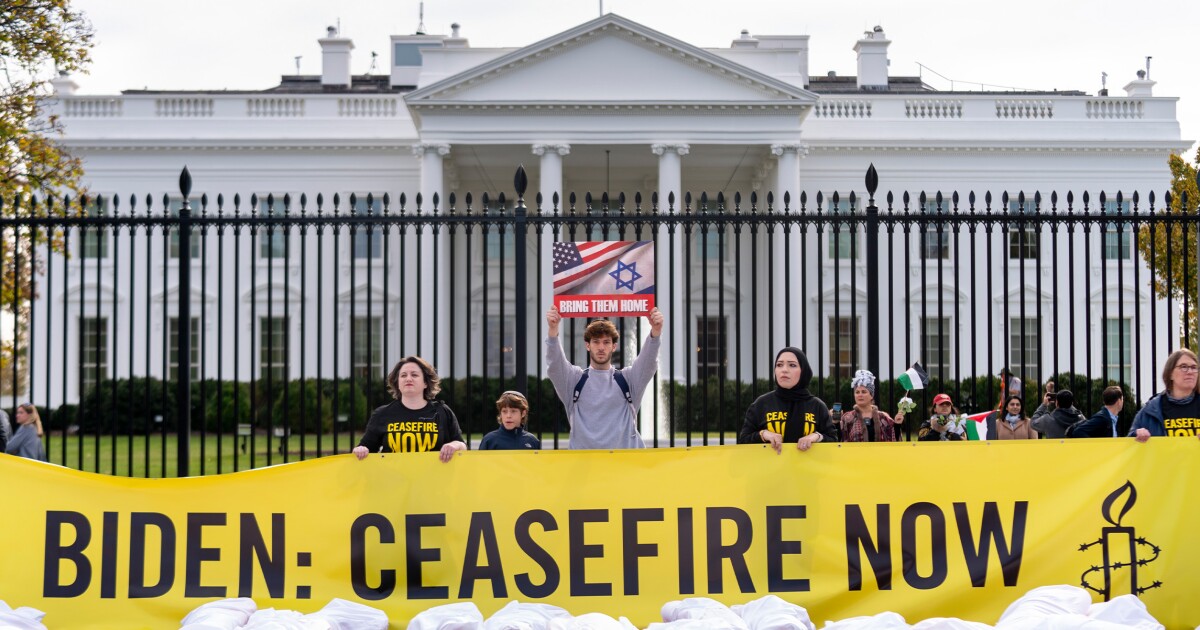

The Israel-Hamas war has exposed a rift between President Joe Biden and the far Left of the Democratic Party, though that divide may not be to his detriment on Election Day.
Biden, who first visited Israel 50 years ago as a 30-year-old Democratic senator from Delaware, has strongly and consistently supported the country in its battle with Hamas after the terror group’s Oct. 7 attacks claimed about 1,200 lives and hundreds of hostages. That despite calls for a ceasefire from progressives.
BIDEN’S ‘PATHETIC’ NEW HAMPSHIRE CAMPAIGN ALLOWING DEAN PHILLIPS TO MAKE A ‘SPLASH’: SUNUNU
“There are moments in this life — and I mean this literally — when the pure, unadulterated evil is unleashed on this world,” Biden said in his first public remarks after the Oct. 7 attacks in southern Israel that launched the war. “The people of Israel lived through one such moment this weekend. The bloody hands of the terrorist organization Hamas, a group whose stated purpose for being is to kill Jews. This was an act of sheer evil.”
But protesters across the United States in the weeks since have loudly made the case that Israel is the one doing wrong — and that Biden shares the blame.
Pro-Palestinian demonstrators have blocked bridges and clashed with police, including at the Democratic National Committee in an altercation that left six police officers injured. Protesters even showed up when Biden visited Atlanta for the funeral of former first lady Rosalynn Carter, shouting, “Biden, Biden, you can’t hide. We charge you with genocide!” as the motorcade approached.
Rather than retreat or moderate his stance, Biden has doubled down in recent weeks.
Biden called the DNC after the riots to thank law enforcement for protecting staffers who were trapped in the building. At about the same time, the White House blasted the circulation and praise of a letter written by Osama bin Laden, with spokesman Andrew Bates saying, “There is never a justification for spreading the repugnant, evil, and antisemitic lies that the leader of al Qaeda issued just after committing the worst terrorist attack in American history.”
The Biden campaign also shot down rumors it would join Chinese Communist Party-linked social media app TikTok, which is popular with young people and on the platform on which the bin Laden letter was circulating.
If those moves may alienate younger or more liberal voters, they’ll help keep Biden engaged with the broad middle, argues Democratic strategist T.J. Rooney.
“Campaigns and elections are about a lot of things, but at their core, they’re a math problem,” Rooney said. “I’ve always used the analogy that there are 10% of people on either side who are just out there, the tinfoil hatters that represent a unique perspective. And in the middle are 80%.”
In this view, while Biden might lose the 10% who are blocking bridges and shouting outside funerals, he stands to appeal to a wide swath of the 80% who aren’t on the political fringes. This is an especially apt strategy against former President Donald Trump, who is leading the GOP nominating contest but remains a polarizing figure, Rooney told the Washington Examiner.
“The more the president is able to speak to people about things in ways they can, if not agree with, at least appreciate, there’s a much larger slice of the pie he can appeal to,” Rooney said.
A related topic is that even far Left voters who strongly disagree with Biden’s Israel policy will not have a major party candidate who shares their views next year. They may either stay home or vote for a third-party candidate, a prospect that has Democrats worried, though they may also be scared by the prospect of a Trump presidency into coming home for Biden.
Still, polls are showing Biden has little room for error as he’s neck-and-neck with “The Donald” and trailing more establishment GOP candidates such as former South Carolina Gov. Nikki Haley.
NBC News has reported that 70% of voters between ages 18 and 34 disapprove of Biden’s handling of the Israel-Hamas war, and the same poll found Biden trailing Trump.
“There are going to be a number of polls that are going to be coming out, which obviously we respect,” White House press secretary Karine Jean-Pierre said when asked about the surveys. “But what I’ll be very clear about is that we are not going to govern by polls here.”
Not everyone is convinced that Biden’s Israel support represents an appeal to the middle. Andra Gillespie, a political science professor at Emory University in Georgia, said Biden is reflecting the older, established U.S. foreign policy stance toward Israel, which is now encountering a generational shift with young Democrats more favorable to Palestinians.
“There is a question about whether or not President Biden’s decision to largely stay the course on Israel policy will affect their support,” Gillespie said.
Those progressives have shouted the word “genocide” about Biden and Israel during their rallies, while the White House continues to insist the term applies accurately and solely to Hamas.
“The president understands that there are strong feelings here on multiple sides,” National Security Council coordinator John Kirby said at a Nov. 27 White House press briefing. “He also believes right down to his core that the approach we’ve been taking has been getting results. It has helped enable Israel to deal with what is, quite frankly, a genocidal threat to their existence by Hamas.”
CLICK HERE TO READ MORE FROM THE WASHINGTON EXAMINER
Gillespie said the war and foreign policy generally may play a bigger role than it has in past presidential elections but argued that domestic topics will still be the deciding factor in 2024. The key there will be Politics 101 — maximizing turnout.
“For those Democrats for whom [the Israel-Hamas war] is important, the question is whether or not they show up to vote at all,” she said. “That will be part of the large mobilization campaign that Democrats will have to engage in in order to make sure they get their supporters out.”





